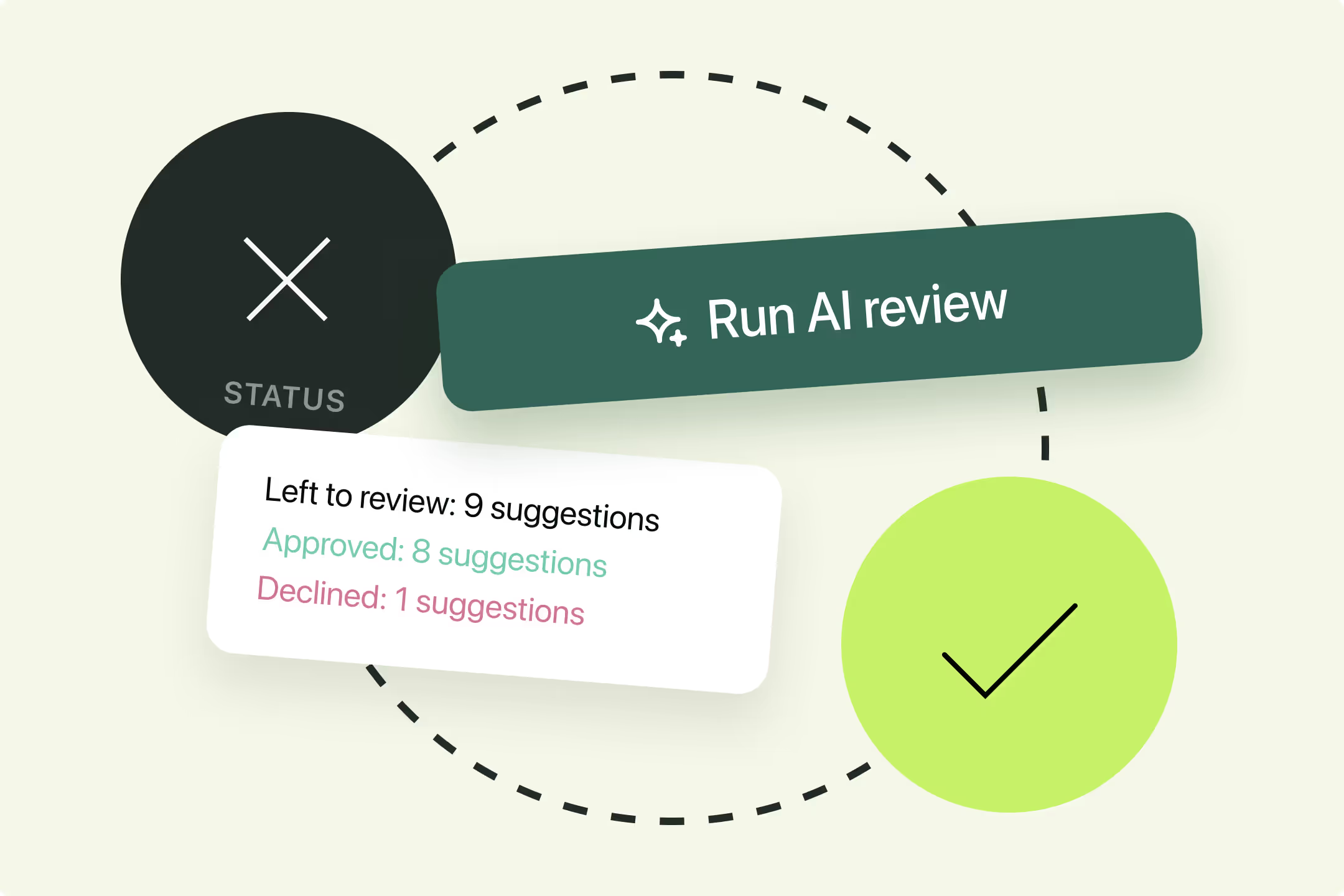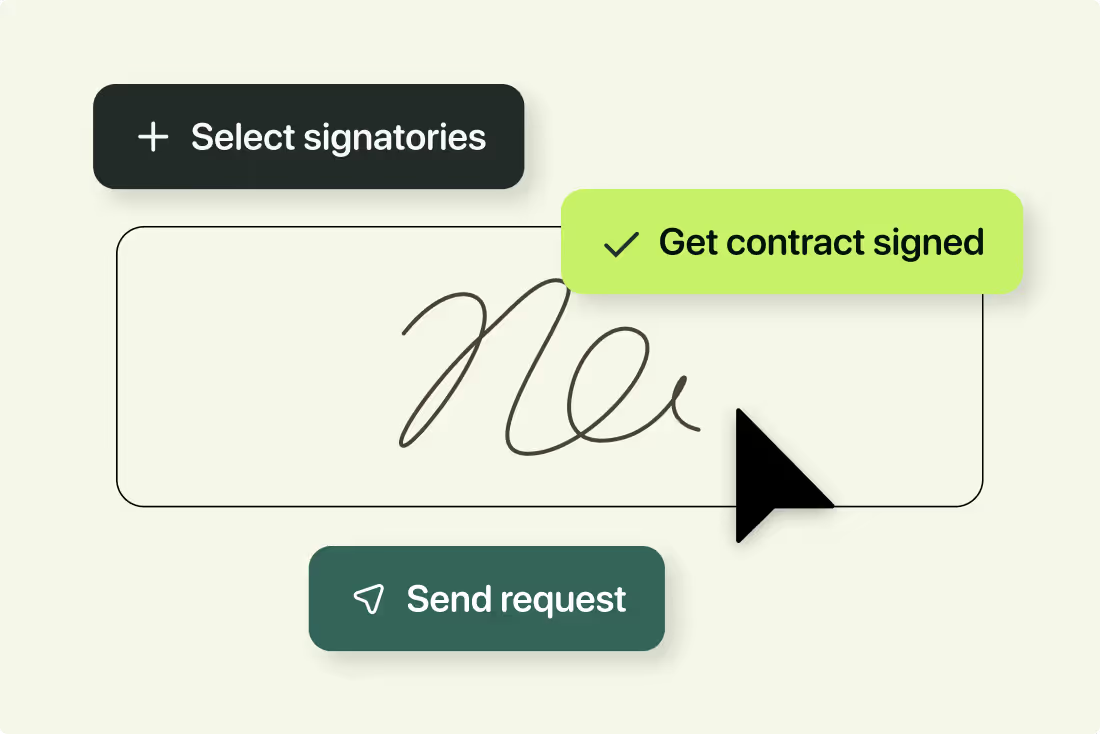Solutions
Customer Support
Resources
You’ve drafted, reviewed and negotiated a contract. Now your work is done, right? Wrong. The next stage of the contract lifecycle is also the most important one: contract execution.
But what does it actually mean to execute a contract, and how can you ensure contract execution runs smoothly? This Juro explainer covers everything you need to know about contract execution, from who does it through to how to store executed contracts.
Read on to find out more.
Executing a contract is the process of finalizing a legally binding contractual agreement between two or more parties and committing to the terms contained within that contract.
Contract execution occurs when the contract’s terms have been agreed upon by the contract’s parties and the contract has been signed. From there, contract execution involves actually fulfilling these specific obligations and doing so within the timeframe established by the contract.
A contract has been executed once all of the contractual obligations have been fulfilled in their entirety. Therefore, the process of finalizing and fulfilling these obligations is the process of contract execution.
Executing a contract is important since it ensures certainty and accountability for the parties involved in the relationship.
If a contract has been drafted and negotiated but not finalized, it’s only as good as any other promise. However, if a contract has been formally agreed and signed by the signatories, it then carries legal weight and the decision not to adhere to the terms of the contract can result in legal consequences.
Why does that matter? Well, when parties enter into a contract they often rely on the promises made by the counterparty, and sometimes to their detriment. This means that they might suffer a loss if the other parties don’t stick to their promise.
By signing and executing a contract, businesses (and individuals) can ensure that these promises carry legal weight and remain enforceable. Hence, it’s important to execute a contract - not just draft it.
Put simply, all parties to a contract are responsible for executing it. However, the signatories play a particularly important role in doing so.
One thing to consider is that when signing the contract on behalf of a company, you’ll need to ensure that you have signatory authority first. This means having the legal right to enter into a business contract on behalf of your company.
Without this, you’ll be unable to execute a contract yourself, and you may need to involve other individuals with signatory authority in the execution of a contract instead.

Interestingly, there are two different perceptions of what a ‘fully executed contract’ looks like. Fortunately, both perceptions are completely valid.
To some, a fully executed contract is a one that has been signed without objections by all of the relevant parties. Post-signature, all signors are legally obligated to fulfil the commitments they made within the contract, and the contract has been fully executed.
However, some individuals understand a fully executed contract to be one that’s not only been signed, but also completed. This means that all of the obligations have been fulfilled, not just formalized.
Working to the second description is likely the best idea though, as this is the stage of the contract lifecycle whereby the contract’s terms have been fully executed and both parties should leave the contract satisfied with the outcomes. That’s exactly what we want from contracts.
If we follow the second description of an executed contract, the difference between an executed contract and an executory contract is that an executed contract has been agreed and signed by all parties, as well as being fulfilled.
An executory contract, by comparison, is a contract that may still be in progress and has not yet been fully executed.
Great, so you know what executing a contract means. But how do you actually do it?
Here’s how you can execute a contract in a few simple steps.
Prior to executing the contract, you need to review it. If there are any terms that flag as unclear or ambiguous it’s important to gain clarity over these before you sign the contract - not after.
After all, the purpose of a contract is to clearly outline the obligations each party owes each other. Without this clarity, a contract can be too blunt an instrument. For example, is it an exclusive contract, or non-exclusive?
It’s critical for any vague or misleading terms to be discussed prior to signing the contract, as these can become binding post-signature, making it difficult to escape the commitments. There also needs to be a certain level of certainty within the contract for it to be enforceable.
To more advice on how to review contracts thoroughly, check out this guide to contract review.

Before you execute anything, you need to check that you (and any other stakeholders) have fully understood and approved all the contract terms internally.
One way to ensure that the contract has been thoroughly reviewed and subsequently approved is to set up approval workflows for your contracts. This can be done using a contract automation tool like Juro, where users can set up sequential or conditional approval workflows depending on the type of contract and terms within it.

An approved contract is not the same as a signed one. Once the contract is in its final form and has been approved, you’ll need to know who’s in charge of signing it off. This is usually the job of the contract manager or a key stakeholder from within another department.
Whoever they are, ensure that they’re ready to sign the contract quickly and efficiently to prevent any further delays. Again, one of the best ways to streamline this process is to adopt a contract tool that enables legal and business teams to sign contracts electronically.
Certain tools, like Juro, will even enable users to set up signing workflows whereby contracts are automatically sent to the relevant stakeholders for signing when a contract reaches a certain phase. Alternatively, you can use Juro to send contracts for signing in bulk.

Next it’s time to put pen to paper and get the contract signed. Unless, of course, you’re ditching wet ink signatures and opting for an electronic signature instead.
Either way, adding the signature to the contract is essential to making it legally binding, so it’s critical to executing your contract.
Once the contract is fully signed you need to set to work actually fulfilling your obligations. It can be challenging to ensure contract compliance when managing growing contract volumes, but tracking each contract and its obligations in a contract repository is a great place to start.
By storing all of your contracts in one place you can monitor the progress of each contract individually and track the execution of the contract in real-time. You can also improve contract visibility across the business, helping to ensure that when you execute a contract all of the relevant departments are aware of their responsibilities, too.

It’s common for legal and business teams to neglect a contract once it has been executed. Typically, they’ll store a PDF version of the contract within a shared drive and never look at it again.
But is that really the best way to get value from your executed contracts?
Instead, we recommend storing your executed contracts as structured data. This makes them searchable in the event of any future conflict and enables you to capture important contract data and monitor performance against legal KPIs more effectively.
Seamless contract execution means more deals closed, and faster. Sounds ideal, right?
If you’re looking for a contract tool that streamlines the contract workflow and makes executing contracts simple, try Juro. Juro is the only platform that truly enables you to process contracts end-to-end with one solution. Fill in the form below to find out more.

Lorem ipsum dolor sit amet, consectetur adipiscing elit. Suspendisse varius enim in eros elementum tristique. Duis cursus, mi quis viverra ornare, eros dolor interdum nulla, ut commodo diam libero vitae erat. Aenean faucibus nibh et justo cursus id rutrum lorem imperdiet. Nunc ut sem vitae risus tristique posuere.

